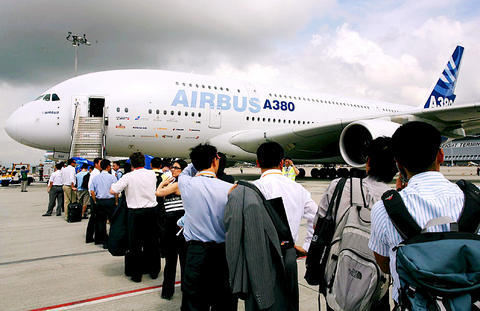British Airways said yesterday it had ordered 12 Airbus superjumbo A380s and 24 Boeing 787 Dreamliner planes.
It said it had also taken an option on a further seven Airbus 380s and 18 Boeing Dreamliners and that all the planes would be equipped with Rolls Royce engines.
British Airways chief executive Willie Walsh said yesterday the airline experienced no political pressure when choosing Airbus' A380 superjumbo over its traditional choice of Boeing's 747 jumbo.

PHOTO: EPA
"There was absolutely none," Walsh told reporters when asked whether political pressure had been exerted. "There was no contact, be it formal or informal. The decision was made in the best interest of British Airways. In the engines, the choice of Rolls Royce was because British is best."
The airline said in a statement on its Web site that the new aircraft will replace 34 of its long-haul fleet and will be delivered between 2010 and 2014.
It said the order had a catalogue value of US$8.2 billion.
Walsh said in the statement the order is the largest fleet order since 1998.
It is also the first time that Airbus will enter BA's long-haul fleet.
The order, including options, will give the airline the ability to grow its capacity by up to four percent per year and the flexibility to tailor its future capacity growth in line with market conditions, it said.
"The aircraft will be greener, quieter and more fuel efficient with significantly lower carbon dioxide emissions and reduced impact on local air quality. This was a key consideration in the order," the statement said.
"These aircraft set the gold standard when it comes to environmental performance in the key areas of CO2 emissions, local air quality and noise. They will contribute significantly to our target of improving fuel efficiency by 25 percent between 2005 and 2025," Walsh said.
"They are also much quieter than their predecessors, which is of vital importance at Heathrow [airport]. Both the A380 and B787 are rated as producing a quarter of the noise level of the B747-400," he said.
The statement said both aircraft bring significant economic benefits with lower costs per seat.
They are both long-range aircraft and bring more flexibility to the fleet as, unlike the Boeing B767 that they replace, they can be flown across the airline's network.
British Airways said it will continue to consider the most suitable aircraft to replace its remaining Boeing B747-400 aircraft and is examining the Boeing B787-10 and B777-300 ER and the Airbus A350XWB.
The airline said it has arranged for a group of banks to provide US$1.5 billion of debt financing to cover all of the airline's firm orders to the end of 2011.

MORE VISITORS: The Tourism Administration said that it is seeing positive prospects in its efforts to expand the tourism market in North America and Europe Taiwan has been ranked as the cheapest place in the world to travel to this year, based on a list recommended by NerdWallet. The San Francisco-based personal finance company said that Taiwan topped the list of 16 nations it chose for budget travelers because US tourists do not need visas and travelers can easily have a good meal for less than US$10. A bus ride in Taipei costs just under US$0.50, while subway rides start at US$0.60, the firm said, adding that public transportation in Taiwan is easy to navigate. The firm also called Taiwan a “food lover’s paradise,” citing inexpensive breakfast stalls

TRADE: A mandatory declaration of origin for manufactured goods bound for the US is to take effect on May 7 to block China from exploiting Taiwan’s trade channels All products manufactured in Taiwan and exported to the US must include a signed declaration of origin starting on May 7, the Bureau of Foreign Trade announced yesterday. US President Donald Trump on April 2 imposed a 32 percent tariff on imports from Taiwan, but one week later announced a 90-day pause on its implementation. However, a universal 10 percent tariff was immediately applied to most imports from around the world. On April 12, the Trump administration further exempted computers, smartphones and semiconductors from the new tariffs. In response, President William Lai’s (賴清德) administration has introduced a series of countermeasures to support affected

CROSS-STRAIT: The vast majority of Taiwanese support maintaining the ‘status quo,’ while concern is rising about Beijing’s influence operations More than eight out of 10 Taiwanese reject Beijing’s “one country, two systems” framework for cross-strait relations, according to a survey released by the Mainland Affairs Council (MAC) on Thursday. The MAC’s latest quarterly survey found that 84.4 percent of respondents opposed Beijing’s “one country, two systems” formula for handling cross-strait relations — a figure consistent with past polling. Over the past three years, opposition to the framework has remained high, ranging from a low of 83.6 percent in April 2023 to a peak of 89.6 percent in April last year. In the most recent poll, 82.5 percent also rejected China’s

PLUGGING HOLES: The amendments would bring the legislation in line with systems found in other countries such as Japan and the US, Legislator Chen Kuan-ting said Democratic Progressive Party (DPP) Legislator Chen Kuan-ting (陳冠廷) has proposed amending national security legislation amid a spate of espionage cases. Potential gaps in security vetting procedures for personnel with access to sensitive information prompted him to propose the amendments, which would introduce changes to Article 14 of the Classified National Security Information Protection Act (國家機密保護法), Chen said yesterday. The proposal, which aims to enhance interagency vetting procedures and reduce the risk of classified information leaks, would establish a comprehensive security clearance system in Taiwan, he said. The amendment would require character and loyalty checks for civil servants and intelligence personnel prior to